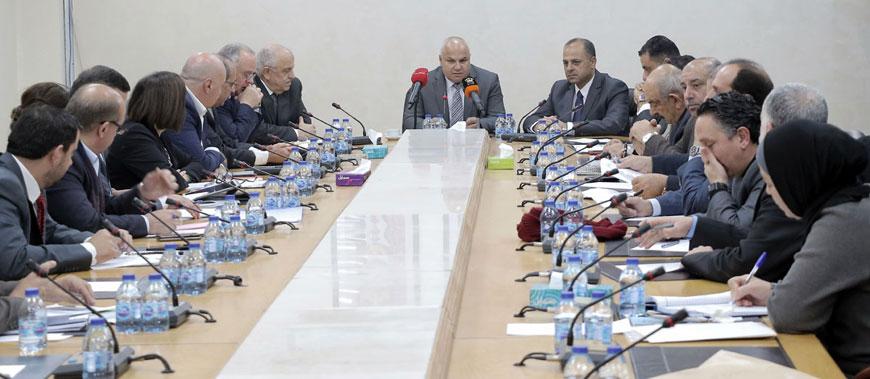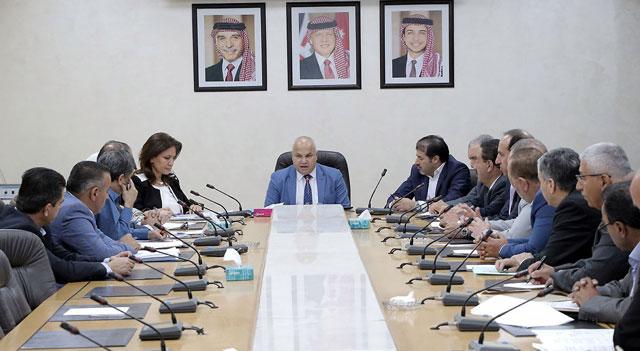You are here
Economic officials meet ahead of Ramadan to talk gov’t preparedness, policies
By JT - Apr 22,2019 - Last updated at Apr 22,2019

Parliamentary MP committees meet with the ministerial economic team on Sunday (Petra photo)
AMMAN — Parliamentary committees and the ministerial economic team on Sunday agreed to allow loan payments due to banks to be postponed, without any extra interest accrued during the holy month of Ramadan.
The committees also recommended developing a national financial reform programme in alignment with the International Monetary Fund’s (IMF) reform programme. They also stated that no new taxes or hikes would be implemented if the IMF’s reform programme was expanded or a new programme was created.
These recommendations were approved during a meeting held between the Lower House’s Financial Committee and a ministerial economic team, headed by MP Khaled Bakkar.
Bakkar said that the meeting was held to check on the government’s commitments and pledges in terms of economic policies meant to achieve economic growth.
The meeting was also convened to follow up the government’s readiness for Ramadan, he added.
The recommendations included allowing traditional markets and bazaars to sell local products during Ramadan, the Jordan News Agency, Petra, reported.
During the meeting, MP Khaled Abu Hassan, president of the Public Services and Transport Committee, said that the government needed to adopt a comprehensive policy to provide radical solutions to the sector’s problems.
He asked the government to speed up payments to construction companies, Petra added.
During the meeting, President of the Energy and Mineral Resources Committee MP Haitham Zayadin asked the government to reconsider the electricity tariff to alleviate citizens’ burdens.
Deputy Prime Minister Rajai Muasher told those attending the meeting that the IMF and Jordan had held difficult negotiations, mainly on the energy sector, but the government managed to convince the fund that Jordan had met all of the IMF’s conditions.
Muasher added that the issue of raising taxes or imposing new levies had ended, noting that the government was currently working on restructuring the economic sectors and controlling expenditures.
He also touched on an agreement with banks to delay citizens’ payment during Ramadan, without incurring any additional costs on citizens, noting that most banks had agreed to the proposal.
During the meeting, Finance Minister Ezzeddine Kanakrieh said that figures for the first quarter of 2019 showed that revenues had increased with a lower sales tax, thanks to the so-called “tobacco case”.
The minister pointed out that the financial deficit for the first three months of the year stood at JD262 million, while the general debt-to-GDP ratio marked 94.4 per cent.
Water Minister Raed Abul Saud stressed that there was no intention to raise the price of water on citizens, in light of the high cost of electricity, noting that work was still ongoing to reduce water loss and improve the efficiency of water pumps.
Regarding the “differences in fuel price” category, Energy Minister Hala Zawati said that the item has witnessed a “clear and continuous decline” from 24 fils per kilowatt to 10 fils, noting that work is ongoing to reconsider consumer categories and electricity tariffs after adopting plans to reduce costs.
Related Articles
The Cabinet on Wednesday authorised Finance Minister Umayya Toukan to forge ahead with negotiations with the International Monetary Fund (IMF) to enable Jordan to benefit from the IMF’s Extended Fund Facility.
AMMAN — The Lower House’s Financial Committee on Monday recommended restoring all the amounts, totalling JD704, 000, disbursed from electric
AMMAN — Jordan said on Monday that it is fully committed to the $700 million Extended Fund Facility (EFF) with the International Monetary Fu
















